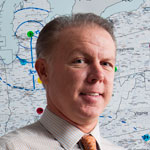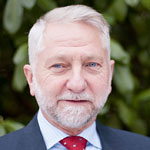The role of the modern HR department has changed, and Ron Leonhardt has seen the shift occur. Whether it be sitting at the strategic table, maintaining continuity on a global level, or fostering a company’s cultural brand, today’s HR professionals are asked to be involved in almost all aspects of business. But most importantly, these departments focus on the one commodity that is any organization’s most precious asset: its people. Perhaps nowhere is working with people and providing a strong ethical culture more rewarding than in the medical-supply and -device industry, which is one reason Leonhardt, as vice president of human resources for Smiths Medical, is dedicated to both his work and the HR field.
Leonhardt began his professional career as a business consultant. In the early 1990s, much of his work centered on implementing enterprise-resource planning and process redesign. “That was big at the time,” he says. “A lot of companies wanted help redesigning their processes and making them more efficient.” More and more of the systems included an HR function, and many of the projects Leonhardt was involved with were HR process-improvement projects. “That’s how my career and my interests evolved and moved towards human resources—that was my trajectory into the field,” he says. “The more consulting engagements I did of that type, the more HR knowledge I garnered.”
Leonhardt took his experience to Smiths Medical, a leading provider of medical devices to not only hospitals but for the home as well. As Smith Medical’s vice president of human resources and environmental health and safety, Leonhardt supports 8,000 employees around the globe with the support of an HR team charged with being the ambassadors of the company’s cultural brand. “At Smiths, we want to ensure that values and culture allow innovation,”
Leonhardt says.
What key qualities define Ron Leonhardt’s leadership style?
Gretchen Rawdon
Vice President, Global Talent Development, United States
“Ron is an enthusiastic leader, and is always striving to maximize the impact HR has on the business and on our employees. He drives multiple priorities to ensure we are building an engaged global team, aligned with our strategy.”
Sohil Bhimani
Regional Human Resources Business Partner, India
“Ron influences individuals and groups with his charismatic personality. He inspires me with his leadership style and drives my passion to deliver my objectives.”
Simon Wilde
HR Director, United Kingdom
“Ron displays an exemplary, role-model leadership quality, whilst adhering to the highest ethical standards. He is a true HR leader, bringing his team on the journey and demonstrating to the business the value add of HR.”
A key aspect of this work is creating a performance-driven culture of ethical behavior and accountability, which Leonhardt’s department accomplishes by hiring people who exhibit this behavior model and by putting ethical training programs in place. One such program is LIFE, named for the company’s core values of leadership, innovation, focus, and excellence. “The program has evolved into an ongoing communications campaign that includes weekly communications from our president,” Leonhardt says. “LIFE is imbedded in our career website, and we start communicating it from the beginning with our new hires in our global onboarding program. Our new employees know about the LIFE campaign beginning with their interview process.”
Having been active in HR-related work for 20 years, Leonhardt has seen the function of his title evolve into something more strategic and global. “In the past, human resources was more administrative, but now we are at the strategic table, being proactive with HR programs that impact business,” he says. “In the past it was more reactive and behind the scenes.”
While the business strategy is consistent on the global level, Leonhardt has observed differences in the execution of the HR programs in the many countries that Smiths Medical is active in. “Operational initiatives are more localized based on the cultural nuances of that country—strategy is global, execution is local,” he explains, offering India as an example where benefit packages include an employee’s parents.
One of the most rewarding aspects of Leonhardt’s work is the company he works for, notably its mission and the role it plays in saving lives. “It’s a luxury to be in an industry where you have the capacity to save lives; everything we do ultimately saves somebody’s life somewhere in the world,” he says. “I’m fortunate to be part of a company that has that capability and does that every day.”
Leonhardt also finds fulfillment in his work as the head of environmental health and safety (EHS). In some organizations, this role is filled under the operations team, but Leonhardt has found that an EHS program administered by the HR team actually creates synergy within a company. Besides being more objective as far as programs and initiatives, the HR function has a lot in common with the goals of a successful EHS program. “It’s about driving a culture so people know they belong to an organization that cares about keeping them healthy, that has a lot of impact in recruiting and retaining people,” he explains. “Keeping employees feeling engaged and empowered, HR should be doing that.”

